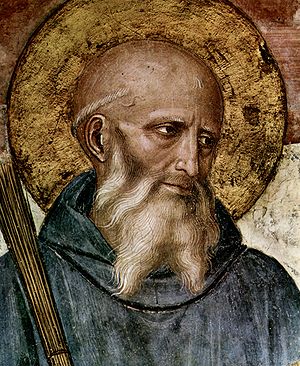
Image via Wikipedia
As today we
celebrate the passing of our holy Father Benedict, I am obliged to say
something about him, especially because I observe that you are eager to listen.
Like good sons you have come together to hear about your Father who, in Christ
Jesus, gave birth to you in the Gospel. Because we know that he has passed
beyond, let us see where he came from and where he has gone.
He came from where
we still are, of course, and he has gone on to that place to which we have not
yet come. And while we are not physically there where he has gone, we are there
in hope and love, as our Redeemer has told us: Where your treasure is, there
also is your heart. Thus the Apostle said: Our dwelling place is in heaven.
Indeed, Saint Benedict himself, while he lived physically in this world, dwelt
in thought and desire in the heavenly Fatherland.
So today our Father has passed from earth to heaven, from prison to the kingdom, from death to life, from misery to glory. From this life which can quite appropriately be called death, he has happily passed over into the land of the living. Deservedly do I say he has passed on to the land of the living because this life is that not of the living but of the dying. All the things which I mentioned earlier --death, prison, and misery--are found in this life. Indeed, all these things are this present life. Now, if it were not death, the Apostle Paul would never have said: Daily I die for your glory, brothers. And again: Unhappy man that I am! Who mil rescue me from the body of this death? Very clearly he calls this life 'death 1 and living in the body, 'dying'.
The psalmist bears witness that this life is a prison as he says: Bring my soul out of prison. That this life is miserable, indeed misery itself, the daily experience of our own miseries teaches each of us. But blessed David calls it a pool of misery and a mire of mud. With undisguised joy he already proclaimed himself freed from it--because he knew he would be freed: He heard my prayers and drew me out of this pool of misery and the mire of mud.
Since we know where Saint Benedict passed from and to, let us see now how he passed. For it would be of no profit to those wishing to follow him if they knew only where he passed from and to, unless they also know how he passed.
Truly he went through Christ to Christ. Through faith in Jesus Christ, which worked in him through love, he passed to the vision and contemplation of Jesus Christ by which is satisfied the desire for all that is good. His way therefore was Christ who said of himself in the Gospel: I am the way, the truth and the life. Through Him he passed to Him because He who is the way is life itself.
The most direct way of our Father was the very best way of life. The way of life was his holiness.
The Liturgical Sermons of Aelred of Rievaulx, Cistercian Fathers, vol. 58.



Leave a comment